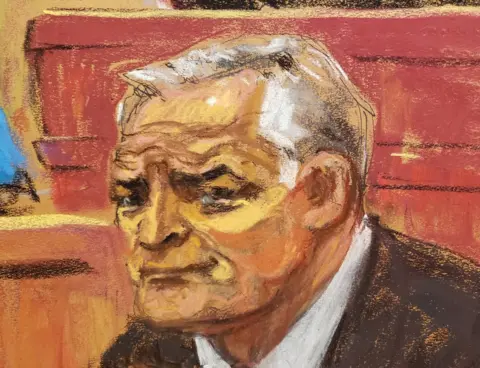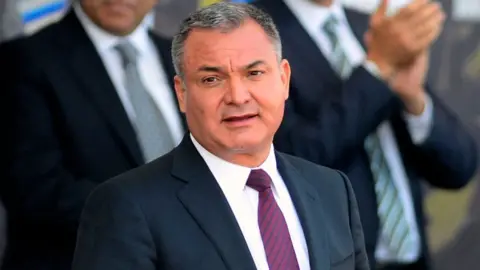Mexico's ex-security minister Genaro García Luna convicted of drug trafficking
 Reuters
ReutersThe former face of Mexico's war on drugs has been convicted by a US jury of drug trafficking.
Genaro García Luna, once Mexico's security minister, was found guilty of taking millions of dollars from Mexico's biggest crime group, the Sinaloa drug cartel.
García Luna - who was arrested in the state of Texas in 2019 - had pleaded not guilty.
The 54-year-old could face life in prison.
At a minimum, García Luna will serve the mandatory minimum of 20 years, according to a statement from the Department of Justice.
The verdict came after a four-week trial and three days of jury deliberation in the US District Court in Brooklyn, New York.
Prosecutors said the former head of the Mexican equivalent of the US Federal Bureau of Investigation accepted millions of dollars stuffed in briefcases and delivered by members of Joaquín "El Chapo" Guzmán's Sinaloa drug cartel.
García Luna, who moved to the US after leaving office, is the highest-ranking Mexican official ever to be tried in the US.
On Twitter, a spokesperson for current Mexican President Andrés Manuel López Obrador, Jesús Ramírez Cuevas, praised the decision and took aim at former Mexican President Felipe Calderón.
García Luna served under Mr Calderón, who oversaw a crackdown on drug cartels beginning in 2006.
"Justice has arrived for the former squire of Felipe Calderón," Mr Ramirez Cuevas wrote. "The crimes against our people will never be forgotten."
In a statement to BBC News, Mr Calderón defended his administration's handling of the fight against organised crime and said that the verdict against García Luna was "already being used to politically attack me."
"I have been the president who has acted the most against organised crime," he said. "I fought to build an authentic rule of law, without which there is no freedom, justice or development."
Mr Calderón added that "with the information available at the time, I took due diligence measures in the creation and operation of the government team".
Ioan Grillo, a Mexico-based British author and expert on Mexico's criminal underworld, told BBC News the conviction has "big implications" for both the US and Mexico governments' fight against corruption and organised crime.
"This could encourage prosecutors to go after other cases," he said. "They took a certain risk by not having physical evidence and convicting him on testimony from drug traffickers."
He added García Luna's conviction could also help dissuade Mexican officials from being "openly corrupt".
"If you're a Mexican agent, you'll be thinking about how much you expose yourself to the Americans," he said.
The ex-minister - widely considered the architect of Mexico's war on drugs - was said to have shared information with the Sinaloa drug cartel about its rivals and warned the group about law enforcement operations.
García Luna denied the allegations.
The claims against García Luna's involvement with the Sinaloa cartel first came to light during a trial against Guzmán, who was sentenced to life in prison plus 30 years in 2019.
A former cartel member named Jesus "Rey" Zambada testified during Guzmán's trial that he had delivered millions of dollars in payments to García Luna.
The case against the former minister was built on the testimony of nine cooperating witnesses, mostly convicted cartel members, including Zambada.
García Luna declined to testify at the trial, but his wife, Linda Cristina Pereyra, took the stand and attempted to downplay their finances and lifestyle.
 Getty Images
Getty ImagesIn her closing argument, US prosecutor Saritha Komatireddy said the Sinaloa cartel could not have built a "global cocaine empire" without García Luna's aid.
"They paid the defendant bribes for protection," she said. "And they got what they paid for."
García Luna's lawyers argued the witnesses were testifying against him to "save themselves" after committing "horrific crimes".
Alejandro Hope, a former Mexican intelligence official, said the conviction would come as no surprise to those closely following the trial in Mexico.
"It was certainly enough to convince the jury, although many others will be unconvinced," he told BBC News.
The conviction could "complicate some parts" of US-Mexico cooperation, he said.
"There won't be any sort of rupture or open dispute," he added. "But ... it will be known that the US has its eyes on Mexican officials. For some, that will make things difficult."
